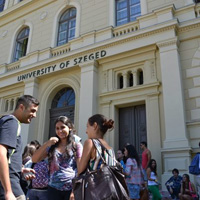
A Szegedi Tudományegyetem Bölcsészettudományi Karának
Neveléstudományi Intézete és Neveléstudományi Doktori Iskolája
"XII. Pedagógiai Értékelési Konferencia - PÉK 2014"
címmel
2014. május 1-3-án tudományos konferenciát szervez
a Szegedi Akadémiai Bizottság székházában
(6720 Szeged, Somogyi u. 7.).
A konferencián elsősorban pedagógiai értékeléshez kapcsolódó empirikus kutatások, innovatív értékelési módszerek, a pedagógiai értékelést a közoktatásban vagy a felsőoktatásban alkalmazó vizsgálatok, pedagógiai kísérletek, innovatív oktatási módszerek, illetve azok eredményei mutathatók be, továbbá e területekhez kapcsolódó elméleti előadások prezentálhatók.
A konferenciát a TÁMOP 3.1.9-11/1-2012-0001 azonosító jelű "Diagnosztikus mérések fejlesztése" című pályázat keretében az Európai Unió támogatta.

Szeged

